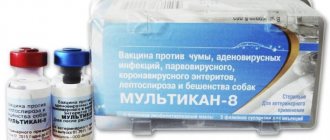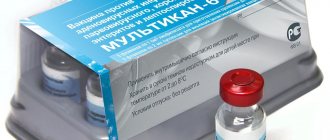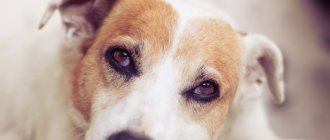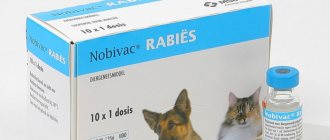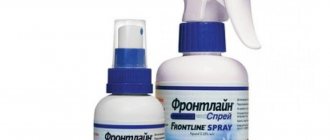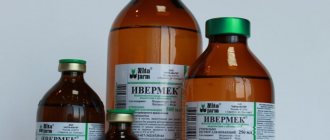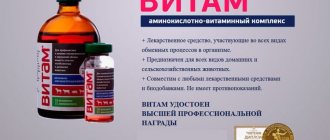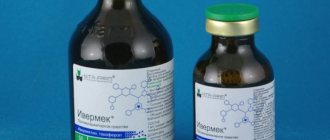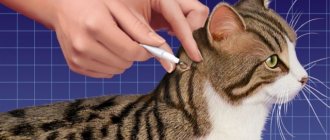Multikan 4 is a vaccine for dogs that prevents distemper, enteritis, and adenoviral infections. The small amount of weakened or inactivated viruses that are present in the drug is administered to stimulate the pet's immune system to produce antibodies. They will protect the body in the future, creating a kind of immunological memory. The product is produced in the form of an injection solution; the packaging consists of a lyophilized component and a liquid to form the solution.
Why you need to immunize your dog
Four-legged pets must be vaccinated regardless of age in order to protect them from many dangerous diseases or alleviate pathological conditions. Before vaccination with Multikan 4, you should consult with your veterinarian and determine which viruses you should protect your pet from.
In the case of canine distemper, both young and old individuals are most at risk. The disease affects the respiratory, digestive and nervous systems, and the mortality rate for infected pets is quite high.
Parvovirus and coronavirus manifest as bloody diarrhea and weakness. Timely treatment offers a good chance of recovery for adult dogs, but therapy is lengthy. These diseases are often fatal for young animals.
Adenoviral infections are accompanied by cough and inflammation of the respiratory system. Despite the fact that these phenomena pass, the disease can lead to irreversible damage to the four-legged pet's lungs.
Multikan is the drug of choice for the domestic brand
The Multikan vaccine is intended to create stable active immunity in dogs. , Biokhim LLC, Russia.
It is notable for being effective and harmless, since it consists of colonies of maximally weakened living microorganisms that do not harm the dog.
Important! This remedy is not a medicine, but serves to create immunity by injecting the drug only to a healthy animal.
What is it used for?
According to the instructions, the Multikan 8 vaccine for dogs is used to prevent the following pathologies:
- carnivore plague;
- respiratory tract diseases caused by adenovirus;
- enteritis caused by parvovirus;
- coronavirus enteritis;
- rabies;
- leptospirosis.
The product is used for both puppies and adult pets. The main feature is that it reduces the risk of developing diseases that are fatal to pets. In addition, if infected, pets tolerate the disease more easily, have a greater chance of recovery and recover faster if treatment is started on time.
Properties
Multikan 4 is a quadrivalent vaccine (against four diseases). Outwardly it looks like a dry, homogeneous substance of a yellowish-pinkish hue. The liquid included in the preparation is colorless, odorless and transparent.
Vials consist of 1.0 and 2.0 ml (one dose) of the active substance or 3.0 ml ampoule. They are sealed with rubber caps, which are secured with aluminum caps, and the ampoule is hermetically sealed. The vaccine bottles are packed in cardboard boxes, and instructions are included with each bottle. The product is valid for one and a half years, after this time the vaccine is disposed of.
The product is stored and transported in the refrigerator, protecting it from children and animals. The active ingredients of the drug without manufacturer's designations or with traces of damage and opening, which have not been used within a quarter of an hour, are boiled for half an hour and then thrown away.
Precautions and special instructions
When using a vaccine, taking into account the specifics of this drug, you must adhere to some rules:
- To carry out the event, protective equipment must be used: mask, gown, gloves;
- Sterile needles or syringes are used during the event;
- It is not recommended to mix the vaccine with other medications in the same syringe/container;
- It is recommended to use the solution in the first 15 minutes after preparing the mixture; during mass events, this period cannot exceed 2 hours;
- It is not recommended to use if there are impurities, damage or deformation of the bottle;
- An unusable mixture must be rendered harmless by boiling for 30 minutes before disposal;
- failures in vaccination and revaccination plans lead to a decrease in the effectiveness of the drug;
- Animals cannot be vaccinated in the first week after prophylaxis against helminths and in the first two weeks after treatment with chlorine- and fluorine-containing preparations;
- if the solution gets on the skin, the surface must be washed with plenty of running water;
- if it is mistakenly administered to a person, the site of administration must be treated with ethyl alcohol and urgently go to the hospital;
- In case of an accidental spill, the contaminated surface must be treated with a 5% chloramine solution.
Instructions
If the mother has a healthy immune system, the puppy will likely receive antibodies in the mother's milk while nursing. But subsequently, pets must receive a series of vaccinations starting at eight to ten weeks. Your veterinarian should administer a minimum of three vaccinations, spaced three to four weeks apart. The final dose should be administered at 11–14 weeks of age. Repeated vaccination should be carried out at twelve months, and then annually immunized with Multican. For small dogs the dose is 1 ml, and for medium and large dogs – 2 ml. In principle, there is no one suitable regimen for each puppy and the choice must be determined individually with a veterinarian.
Before use, the drug is diluted in 2 ml of liquid and brought to a temperature of 36-38 degrees, and shake well before use. Vaccination must be carried out in accordance with all aseptic standards; only disposable syringes are used for injection.
You should not violate the vaccination schedule, because this will inevitably lead to a decrease in the effectiveness of the vaccine. If an unexpected break occurs, the injection must be given as soon as possible.
Depending on the type of pathogen and the drug, the natural defenses of four-legged pets after vaccination can last from several months to many years. Most immunization drugs, which include Multikan 4, provide a significant degree of protection for twenty-four months; after this period, animals must be revaccinated.
Description of the vaccine
Multikan is divided into several varieties - 4, 6, 8. The distinctive features of each type of product lie in their ability to prevent the occurrence of a different number of pathological processes.
Vaccine number 8 is considered one of the more popular ones, since with its help it is possible to prevent the development of most diseases in your four-legged friend.
The drug contains live viruses that contribute to the occurrence of pathologies dangerous to dogs.
There are very few pathogens in the product, and the animal does not become infected with them, but a stable immune system is formed.
In case of infection with a virus after vaccination, lymphocytes give an appropriate response to a familiar infection and prevent its further reproduction. It may be that the available antibodies are not enough to prevent the development of a possible disease.
Over time, the death and disappearance of the injected antibodies is noted. Their effect sometimes reaches up to 2-3 years, in some cases no more than three weeks.
The timing is influenced by indicators such as:
past illnesses;- age of the animal;
- bearing puppies and other physiological characteristics.
To prevent unwanted problems, veterinarians recommend strictly adhering to the established vaccination schedule.
Multikan is not a medicine. It is used not for treatment, but for the prevention of disease. Vaccination is carried out only for healthy animals.
Vaccination stages
Vaccination should occur in several stages:
- Dilution of the drug. The vaccine should be checked to ensure it was properly transported and stored at the temperature stated on the label. After mixing, draw the solution into a syringe and remove excess air bubbles by tapping on the side of the syringe. The needle should be pointing upward.
- Preparing your pet. You should make sure that the dog is clean and there is no visible dirt on the skin around the neck. You need to lift some of your pet's skin near the neck to pinch. This will provide a certain space under the skin where the drug can be injected.
- Carrying out the injection. You should carefully pierce the skin with a needle and insert a syringe. Slowly pressing the plunger of the syringe, inject the Multikan 4 vaccine.
Attention! If blood is visible in the needle, then you need to find another place to inject. This means that there was a hit in a blood vessel, and you cannot inject there.
- Removing the needle. As soon as the needle is pulled out, you need to press your fingers on the injection site and hold them for about 30 seconds. This will prevent bleeding. Place the needle and syringe in an appropriate waste container or glass jar, which should be disposed of at the veterinary clinic.
Personal prevention measures
- When working with the vaccine, you should follow the general rules of personal hygiene and safety precautions provided for when working with veterinary medicinal products.
- All persons participating in vaccination must wear special clothing (robe, trousers, hat, rubber gloves). Places of work must have a first aid kit.
- If the vaccine gets on the skin and/or mucous membranes, it is recommended to rinse them with plenty of tap water.
- In the event of a vaccine spill, fill the contaminated area of the floor with a 5% solution of chloramine or sodium hydroxide.
- If the drug is accidentally administered to a person, the injection site must be treated with a 70% solution of ethyl alcohol, contact a medical facility and inform the doctor about this.
Contraindications
You cannot immunize a sick animal, and in case of chronic diseases, you should consult a veterinarian to make sure that the vaccination is safe for your pet. Before administering Multikan 4, it is necessary to carry out deworming, giving the animal means to combat parasites a week before vaccination. Pregnant bitches and very young puppies (up to six weeks of age) should also not be vaccinated.
Composition of the vaccine and release form of the drug Multikan 4
Multikan-4 is a domestic drug intended for vaccination of dogs. It looks like a dry porous mass, easily soluble in distilled water, and has a yellow-beige tint.
After dissolution, it acquires a bright pink color. Consists of strains of plague virus, adenovirus, coronavirus and parvovirus.
It goes on sale in small glass bottles, closed with a rubber stopper and an aluminum cap (one dose - 2 bottles of 1 ml of dry substance and 2 ml of solvent).
Possible adverse reactions
As with any medical procedure, there is a small chance of side effects. In most cases, the risks are much less than the incidence of the disease itself. Most dogs respond very well to the drug, but serious side effects or allergic reactions of varying severity are possible. In case of negative symptoms, you should contact your veterinarian.
The reasons for the negative consequences of vaccination are very common:
- incorrect injection or incorrect vaccination schedule;
- hypersensitivity to the components of the drug;
- weak immune system of the animal.
In case of negative symptoms, it is necessary to contact a veterinarian, as there are various acute reactions leading to death.
The most common side symptoms are:
- apathy;
- lethargy;
- loss of appetite;
- fever;
- vomiting and diarrhea;
- pain at the injection site;
- abscess;
- mouth swelling and drooling;
- aggressiveness;
- local irritation;
- abnormal coordination.
If your dog experiences any of these signs, you should contact your veterinarian and ask for a change in vaccine in the future. It should be emphasized that very severe allergic reactions occur relatively rarely.
Learn about essential drugs in animals
- Vaccination of puppies
- Vaccination of cats against rabies
- Vaccination of small animals
- Kitten vaccination
- Vaccination of dogs against rabies
- Why do kittens need to be vaccinated?
- Nobivac Triquet Trio
- Nobivac DHPPi for dogs
- Puppy's first vaccination
- Comprehensive vaccinations for cats
- Tick vaccination for dogs
- What vaccinations are given to dogs and why?
- Why is Ursofalk prescribed to cats?
- Instructions for using serenia for animals
- Ursofalk in dogs
- Marfloxin for veterinary medicine
- Instructions for the use of serenia in dogs
- Instructions for using serenia in cats
- Why is Heptor prescribed to a dog?
- Instructions for the use of lidocaine in dogs
- Heptor in cats
- Lidocaine for cats. Can cats use lidocaine?
- Heptral in dogs
- Can cats use marfloxin?
- Marfloxin for dogs (instructions for use)
- Heptral in cats (instructions for use, pharmacology
- Instructions for use of Dirofen for cats
- Instructions for using Vetom in cats
- Instructions: multifel for cats
- Use of fosprenil in cats
^Top
Owner reviews
Svetlana, mistress of the mestizo:
“I found a puppy of an unknown breed on the street, about 8 weeks old. My dog died of distemper a month ago, so I decided to get vaccinated right away. The pharmacy recommended Multikan 4 for four viruses. The puppy tolerated the vaccination well, there were no side effects.”
Andrey, border collie owner:
“I vaccinated my puppy Flik with the drug Multikan 4 at the veterinary clinic. There are also Multikan 6 and 8 from six and eight viruses, but the doctor said that this is too much of a burden on the puppy’s body. Flick tolerated the procedure well. True, there was a little diarrhea, but everything went away quickly.”
Arina, poodle owner:
“We recently got ourselves a poodle. We don’t understand anything about vaccination and nutrition of dogs, so we went to the veterinarian, who recommended that we get vaccinated with Multikan 4. He said that the product was excellent and inexpensive. We trusted him and got the first vaccination at one and a half months, and again after a certain period of time. Our Betsy tolerated both vaccines well, only she slept more than usual. The main thing is to give an anthelmintic seven days before vaccination, not introduce anything new into the diet, and everything will be fine.”
Shelf life and storage conditions
A vaccine is a drug that requires special storage conditions. Multikan-4 must be stored in a dark and cool place at a temperature range from +2 °C to +8 °C.
The expiration date is indicated on the packaging and is 12 months from the date of issue.
And in order not to think about the question of where and how to inject Multikan-4 into a dog, and to prevent accidental mistakes during the procedure, we recommend that vaccination be carried out in a veterinary clinic.
Are there analogues
The Multikan product has several similar drugs that have minor differences in composition.
Among the most popular are:
Biocan;- Eurikan;
- Vanguard;
- Hexadog;
- Nobivak.
There are also other means. What to choose is decided directly by the owner of the animal.
